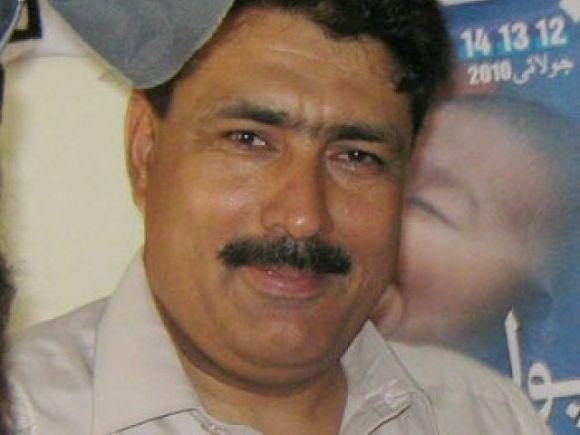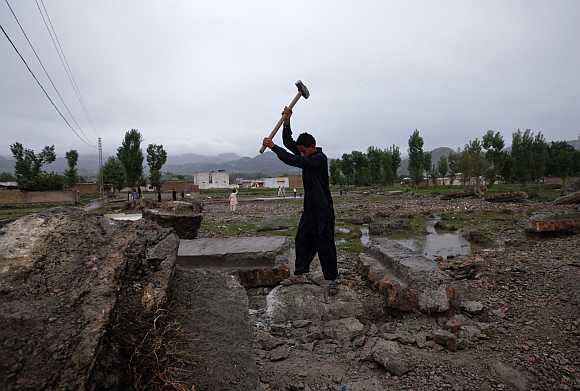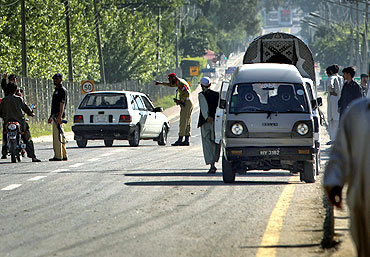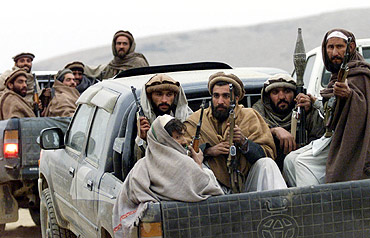 | « Back to article | Print this article |
Unjust to try Dr Afridi under draconian law: Legal experts
Legal experts in Pakistan say that Dr Shakil Afridi was tried under the Frontier Crimes Regulation, a law of the tribal areas, while he committed the crime in Abbottabad, which is outside its jurisdiction. Tahir Ali reports from Islamabad
The punishment awarded to Dr Shakil Afridi -- the man who helped the Central Investigation Agency find Al-Qaeda leader Osama bin Laden -- has created a row between Washington and Islamabad.
Lawmakers are of the view that the punishment under the draconian Frontier Crimes Regulation is unjust and seems like the Pakistani authorities had made up their mind to give him exemplary punishment.
Dr Afridi helped the CIA find Osama bin Laden in the garrison city of Abbottabad in Pakistan through a fake vaccination campaign. Afridi had collected DNA samples of Osama's family to confirm his identity. The Al Qaeda chief was killed by United States Navy SEAL's on May 2 last year.
Click NEXT to read further...
Crime committed outside jurisdiction of agency that passed judgement
Dr Afridi was convicted by Pakistani authorities on charges of treason and has been awarded 33 years rigorous imprisonment by the political administration of Khyber Agency.
The political administration punished Dr Afridi under section 11 of the Frontier Crimes Regulation and sections 121-A (condemnation of the creation of the state and advocacy of abolition of its sovereignty) and 124 (assaulting president, governor, etc, with the intention to compel or restrain the exercise of any lawful power) of the Pakistani Penal Code.
The administration also awarded a 10-year sentence and Rs 100,000 fine on the accused under section under 121-A PPC, 11-year sentence and Rs 1,00,000 fine under section 123 PPC, 10-year sentence with a fine of Rs 1,00,000 under section 123-A PPC and another three-year sentence with a fine of Rs 20,000 under section 124 PPC, read with section 11 of the FCR.
Top legal experts in Pakistan think that Dr Afridi's punishment is unjust. They say he was punished under FCR, the law of tribal areas, while he committed the in Abbottabad, which is a district of Khyber Pakhtunkhwa.
According to leading Pakistani legal expert Barrister Bacha, the offence was committed in Abbottabad which is out of the jurisdiction of Assistant Political Agency of Khyber agency that decided the fate of Dr Afridi.
Click NEXT to read further...
'Several legal flaws in the case against Dr Afridi'
"Dr Afridi was put on trial under the FCR and the offence of treason is not included in the schedule that specifies offences that can be tried by the political agent or assistant political agent. There are several legal flaws in the case and it would be very difficult for the government to defend the sentence in a high court or the supreme court," said Bacha.
Commenting on the case, renowned legal expert advocate Latif Afridi said, "The government authorities had already made up their mind to punish Dr Afridi, so his case was dealt with FCR, the black law. I will say injustice has been done in this case."
"He has been awarded with 33 years, while according to a recent decision of the Peshawar high court, in such cases the punishment should not be more than 14 years," Afridi added.
Legal experts say that Dr Afridi should be tried in settled areas as he did the offence in Abbottabad. Also, he was arrested from Karkhano Market near Peshawar, which is also a settled area.
Another legal expert, Advocate Noor Alam, says that the government used FCR, as the law in settled areas needs more evidence and witnesses to punish someone. "Although in 2011 some amendments were made to FCR, it still remains a black law and is used as a tool of punishment when the other law is not clear about certain cases," he said.
FCR comprises a set of laws of Pakistan that are applicable to the Federally Administered Tribal Areas (FATA). The law states that three basic rights are not applicable to the residents of FATA – appeal, wakeel and daleel (the right to appeal under detention, the right to legal representation, and the right to present reasoned evidence).
Click NEXT to read further...
Dr Afridi entitled to make an appeal against the sentence
The FCR dates back to the occupation of the six Pashtoon-inhabited frontier districts by the British in 1848. The regulation was reenacted in 1873 and again in 1876, with minor modifications.
The regulation was found to be inadequate to contain Pashtoon opposition to British and government rule -- new acts have been added to it from time to time. The regulation took the present form primarily through the Frontier Crimes Regulation of 1901. In 1947, the then Dominion of Pakistan added the clause that residents can be arrested without specifying the crime.
Under FCR the political agent rules a tribal agency like a king and his decision could not be challenged by any Pakistani court.
Article 247 of the Pakistani constitution provides that no act of parliament applies to FATA. In 2011, some amendments were made to the FCR but the law is still a black law.
Earlier, no one could challenge the decision of the political administration. However, after the recent amendments, Dr Afridi is entitled under FCR to make an appeal against the sentence before a recently established three-member tribunal in the Khyber Agency.
The federal government had recently appointed a tribunal, comprising two former bureaucrats and a lawyer, to entertain appeals by those who are aggrieved by the decisions made by the political agent under the FCR.
TOP photo features of the week
Click on MORE to see another set of PHOTO features...




